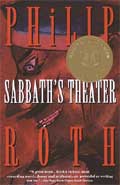 This book review was originally published on Critics’ Choice on September 25, 1995.
This book review was originally published on Critics’ Choice on September 25, 1995.
After decade or two of metaphysical tricks and postmodern identity crises, Philip Roth has finally gotten back around to what he does best: offending people.
Roth’s most intriguing books, after all, have been those in which he’s deliberately crossed the line over various sexual and ethnic taboos. Goodbye, Columbus angered Jews for its unflattering portrait of middle-class Jewish life; My Life As a Man steamed up feminists by portraying an utterly manipulative and conniving wife; and, of course, Portnoy’s Complaint raised eyebrows everywhere with its pure, taboo-shattering sexual energy.
Stirring outrage is exactly what Roth’s latest book, Sabbath’s Theater, his twenty-first, is designed to do. The novel’s protagonist, an aging puppeteer and lecher named Mickey Sabbath, gives umbrage to any number of readers by such grotesque activities as urinating on his ex-lover’s grave, ransacking a friend’s daughter’s underwear drawer for fantasy material, and mocking his wife’s alcoholic recovery programs. Sabbath’s Theater will be fascinating reading for anyone who can put up Philip Roth and his anti-political correctness agenda.
Sabbath’s art (before the onset of arthritis left him unemployed) was obscene puppet theater. The act which both made his name and got him arrested was a Shakespeare-type soliloquy performed by his middle finger — while his other fingers stealthily undressed whatever female audience member happened to be watching at the time. This and other half-unwilling acts of seduction are what Sabbath considers his “art,” but to the prude guardians of conventional morality it’s nothing but sexual harassment.
But more than art, to Sabbath lechery is the entire summation of his existence, the whole purpose of his tenure here on earth. Even now at sixty-four he regrets not a single one of his numerous infidelities. As a matter of fact, it’s the death of his mistress of fifteen years that’s causing him so much grief — as well as the fact that at his age it’s tough to find a replacement so late in the game.
Refreshing as it is to see Philip Roth move away from the sometimes tedious head games he played in the Zuckerman Trilogy and Operation Shylock (wherein he ludicrously claimed to have been a spy for the Mossad), Sabbath’s Theater doesn’t feel entirely genuine. Much like the film producers that parade their NC-17 ratings on television for hype value, so too Roth needs to exercise more subtlety as he pulls our strings.
correction: Sabbath does not urinate on his ex-lover’s grave (which would not be the worst of all possible actions), moreover, he masturbates on it
He both masturbates and urinates on her grave.